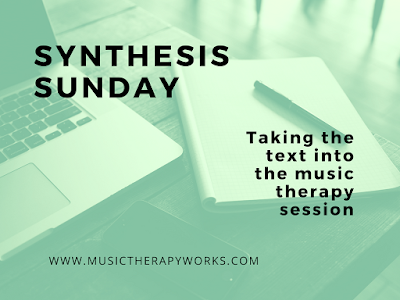Synthesis Sunday: Chapter Five in Music Therapy in Context
I am a bit behind this week, and I am going to read as I write since I didn't get my reading done before this time. Fortunately, I have some extra time on Sunday mornings to catch up, so here we go. (Also, on Sunday mornings, the cat wants more cuddle time, so this may be interrupted by that as well. In fact, I think I'll go read, take notes, and be the cat's sofa for a bit. See you soon.)
Okay. I've read (well, skimmed) through the chapter, but I'm not sure how much I really want to say about it. Here goes.
Chapter Five, "Perception, Cognition, and Improvisation," addresses some of the differences between how cognitive psychologists and music therapists perceive music, our music therapy relationships, and how we interact with clients during clinical improvisation. For me, the most relevant concept shared in the chapter was that clients often hear music as a whole - one experience. As music therapists, we often hear the elements of music - we experience the entire music as music, but we also hear and analyze the parts that make up that music.*
*This is part of my philosophy, so I may be projecting this into Mercedes Pavlicevic's writing, but I do think that I perceive music on a level different from my clients and most other human beings. I think that all music therapists do as well. We can't really help it - it's part of our training as music therapists to hear melody lines, harmonic structures, timbres, etc.
Most of this chapter covered the things I learned in my cognitive psychology coursework in graduate school - schemata, global perception, perceptual grouping mechanisms, horizontal and vertical structures in music, Gestalt principles, higher order groups, and invariants. It was a very good review for this clinician who hasn't cracked a psychology text in many years.
I'll read this chapter over again. It deserves a closer reading than I've given it today.
Happy Sunday, all.
Pavlicevic, M. (1997). Music therapy in context: Music, meaning and relationship. London: Jessica Kingsley.


Comments
Post a Comment